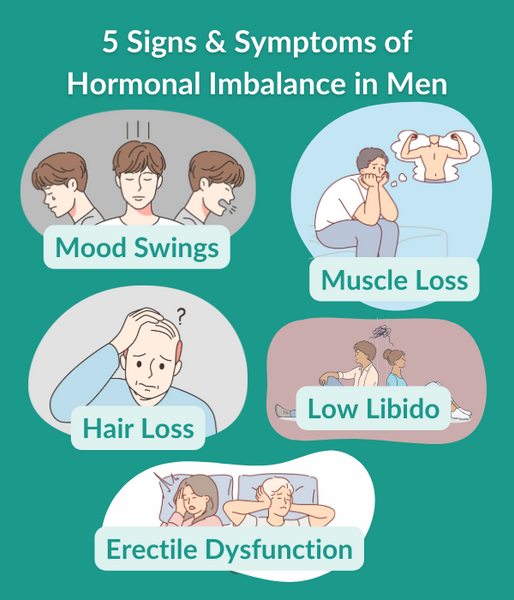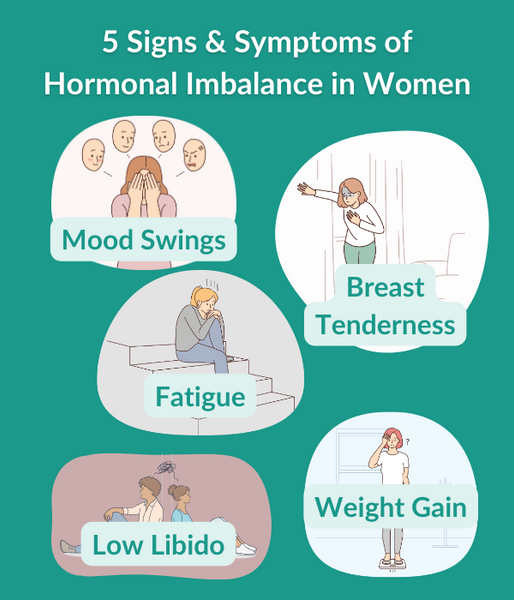Are Your Hormones Healthy? Five Signs and Symptoms of Hormonal Imbalance

Fatigue, lack of intimacy, feeling anxious and depressed--if you aren't feeling like yourself, it might be more than a bad week at work. Hormonal imbalances can leave you feeling like a shell of your former self.
In this article, we'll cover how hormones shape our health and five commons signs and symptoms of hormonal imbalances in men and women.
What are hormones?
Hormones are the body’s chemical messengers. They tell our body to eat more, eat less, build muscle, grow hair, have sex, and many, many other physiological processes as well.
Just a few of the important bodily functions our hormones control:
- Metabolism
- Blood Pressure
- Blood Sugar
- Body Temperature
- Growth
- Sexual function
- Fertility
- Sleep cycle
- Mood
While many of us associate the word “hormones” with sex hormones such as estrogen and testosterone, other chemical messengers like insulin, serotonin, and adrenaline also act as hormones. Overall, scientists have identified over 50 hormones in the human body, and the list keeps growing as we discover new functions, triggers, and pathways.
Because hormones manage so many of our essential physical processes, insufficiencies and imbalances in these keystone chemicals can wreak serious havoc on our health. Too little or too much of one chemical or another can leave us feeling exhausted, depressed, and seriously unwell.
What is hormonal imbalance?
When the body produces too much or too little of one or more hormones, it may result in a hormonal imbalance.
Because hormones govern so many of our physical processes, the impacts of even a slight hormonal imbalance can be severe and wide-ranging.
In more serious cases, hormonal imbalances can lead to serious medical conditions which require medical treatment. Some common examples include diabetes, polycystic ovary syndrome (PCOS), thyroid disease (both hyper- and hypothyroidism), and adrenal insufficiency.
Even when hormonal imbalances don’t disrupt our health, they can disrupt our mood, our sleep, and our physical appearance in ways that can be frustrating or upsetting.
Hormonal imbalances can be caused by an array of factors, including genetics, exposure to environmental toxins, and poor diet. Other common causes include:
- Certain medications or medical procedures
- Tumors (cancerous or benign)
- Stress
- Injury
- Malnutrition
- Puberty
- Pregnancy
- Menopause
- Aging
- Autoimmune conditions
Hormonal imbalance in men
The most common form of hormonal imbalance in men is low testosterone, sometimes referred to as “low T.” Testosterone is a sex hormone produced in the gonads (testes for men and ovaries for women) and is the main driver in the development of male characteristics in fetuses and at puberty.
While testosterone is also present in women, men require higher testosterone levels in order to maintain healthy reproductive functioning.
Testosterone signals several important processes including (but not limited to): sperm production, production of red blood cells, muscle strength and growth, bone strength, and sexual interest (libido). While testosterone naturally peaks for men between the ages of 11 to 17 and then declines with age, low testosterone can occur at any stage of life.
In general, there are two main types of low testosterone in men, also known as hypogonadism.
Classical male hypogonadism can be caused by an underlying medical condition (such as cancer), a congenital condition (such as Klinefelter syndrome or Kallmann syndrome), or an injury to the testicles, hypothalamus, or pituitary gland.
Meanwhile, late-onset male hypogonadism occurs as a result of age-related testosterone reduction.
5 Common Signs of Hormonal Imbalance in Men
- Loss of muscle mass and/or increase in body fat
- Hair loss
- Mood swings
- Erectile dysfunction
- Low sexual interest
Worried about your hormones? We offer a free hormonal health check for men.

Hormonal imbalance in women
In women, hormone levels naturally shift in response to a variety of life events and milestones, including pregnancy, puberty, menopause, and where you are in your ovulation cycle. As the body responds to these fluctuations, things can get out of whack.
One of the most common hormone imbalances in women is estrogen dominance. Estrogen is one of several hormones which regulate the development of female characteristics.
Both men and women have (and need) a certain amount of estrogen in their bodies to signal important processes in the cardiovascular, skeletal, and nervous systems. Critical functions of estrogen include:
- Regulation of cholesterol levels
- Regulation of blood sugar
- Regulation of blood pressure
- Maintaining healthy bone and muscle mass
- Collagen production and skin health
- Brain function, especially concentration
- Ovulation
- Fertility
- Vaginal health
- Sexual interest (libido)
In estrogen dominance, the critical balance between estrogen and progesterone–another hormone crucial to reproductive health–is disrupted. This disruption may take the form of elevated estrogen levels (and normal progesterone levels) or healthy estrogen levels paired with low progesterone levels.
Because one of progesterone’s primary functions is to limit the thickening of the uterine lining during ovulation (while estrogen encourages this lining to grow), estrogen dominance can result in heavy, painful periods, irregular periods, and even fibroids (non-cancerous tumors) within the uterus.
5 Common Signs of Hormonal Imbalance in Women
- Mood swings
- Fatigue
- Decreased sexual interest
- Weight gain
- Breast pain, swelling, and/or tenderness
Want to learn more? Use our free female hormone fact check.

What can I do to lower my risk of hormonal imbalance?
While it’s impossible to totally prevent hormonal imbalances, especially if you have a pre-existing health condition, certain lifestyle changes can help you lower your likelihood:
- Exercise regularly. The CDC recommends 150 minutes of moderate-intensity physical activity each week, with at least two days devoted to strength-based exercise.
-
Eat a healthy diet with a focus on whole foods, such as fruits, vegetables, healthy fats, lean meat, and whole grains.
-
Limit consumption of processed and sugary foods.
- Limit your caffeine consumption
- Avoid smoking / tobacco products
- Limit alcohol consumption
- Get a healthy amount of sleep each night
- Consider supplementation. Depending on your needs, you might benefit from adding hormone-balancing supplements to your health regimen. The right supplement can help support your body in creating and regulating your hormones.
Where to buy supplements for hormone imbalance
Our online shop offers high-quality Standard Process supplements to support hormone imbalances the natural way. Our selection of 63 organic supplements provides targeted hormone support across a wide spectrum of health concerns.
Top-sellers include: Standard Process Wheat Germ Oil (general hormone support and anti-inflammatory). MediHerb Chaste Tree by Standard Process (promotes healthy progesterone and prolactin levels, eases discomfort associated with premenstrual syndrome (PMS), supports healthy, regular periods). And MediHerb Tribulus (libido support, male fertility, testosterone).



